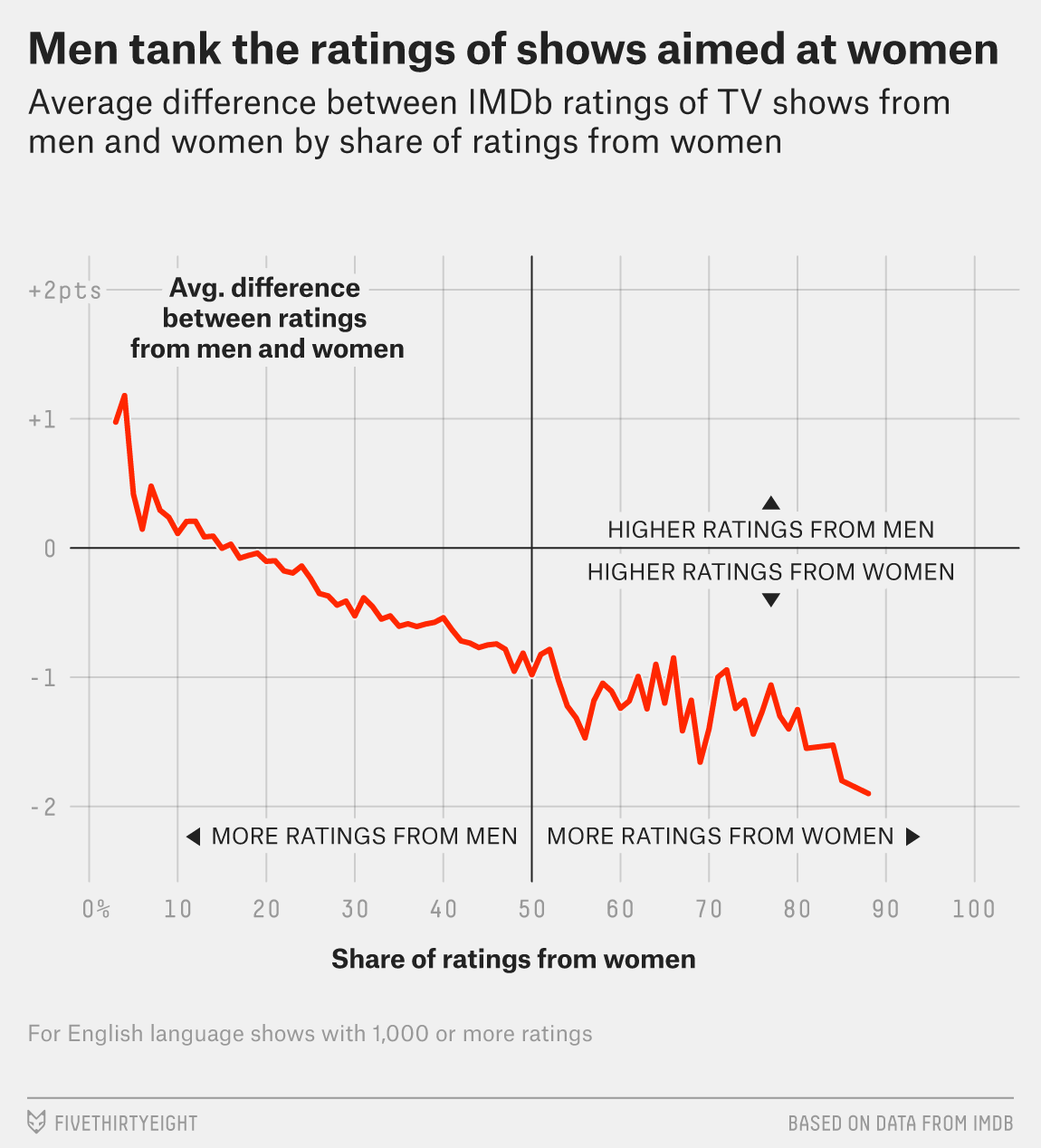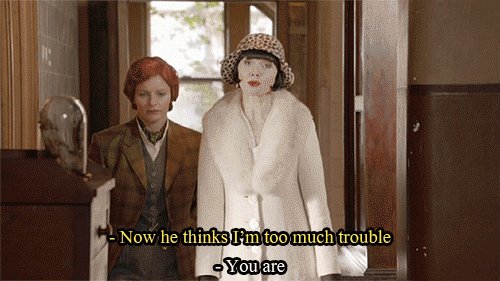title: Men are sabotaging TV show ratings (and admissions committees?) link: https://claireduvallet.wordpress.com/2017/02/28/men-are-sabotaging-tv-show-ratings-and-admissions-committees/ author: cduvallet description: post_id: 874 created: 2017/02/28 02:28:13 created_gmt: 2017/02/28 02:28:13 comment_status: open post_name: men-are-sabotaging-tv-show-ratings-and-admissions-committees status: publish post_type: post
Men are sabotaging TV show ratings (and admissions committees?)
I came across this FiveThirtyEight article looking at how men and women rate TV shows on IMDB. I love the creative analysis that the author did - it’s pretty simple data (just ratings and associated gender of the rater) but the story that comes out is really interesting. The author uses the “skewness” of ratings (i.e. what percent of ratings are made by men vs. women) as a proxy for how preferred the show is by one gender over the other. For example, a show with a large proportion of male raters is something like Star Trek whereas a show with a large proportion of female rates is something like Gilmore Girls. (Interestingly, I associate Star Trek with a pretty even gender split - I guess that says quite a bit about the kind of community I’m in! :P) This figure was particularly striking:  The x-axis differentiates TV shows based on whether more men or women rated it; the y-axis shows the difference between how men rated the show versus how women rated it. The place where the red line crosses the x-axis illustrates that for a show to have the same average score from men and women, 85% of its raters were men. If we extrapolate the gender skewness of raters to how targeted a show is to a certain population, that means that for an average man to like a show as much as an average woman, it needs to be highly targeted for men. This article is just about TV shows. What if it were about admissions or hiring decisions? Why wouldn’t we expect a similar trend? People like what they like, and people who are used to being the majority voice in society probably trend towards others whose voices are similar - to shows, applicants, and potential faculty who are better targeted for them. Another interesting parallel was a great line snuck in the intro:
The x-axis differentiates TV shows based on whether more men or women rated it; the y-axis shows the difference between how men rated the show versus how women rated it. The place where the red line crosses the x-axis illustrates that for a show to have the same average score from men and women, 85% of its raters were men. If we extrapolate the gender skewness of raters to how targeted a show is to a certain population, that means that for an average man to like a show as much as an average woman, it needs to be highly targeted for men. This article is just about TV shows. What if it were about admissions or hiring decisions? Why wouldn’t we expect a similar trend? People like what they like, and people who are used to being the majority voice in society probably trend towards others whose voices are similar - to shows, applicants, and potential faculty who are better targeted for them. Another interesting parallel was a great line snuck in the intro:
When you rely on the wisdom of the crowd on the internet, you risk relying on the opinion of mostly men.
When we rely on the STEM “meritocracy,” I think we risk relying on the opinions of mostly old-ish white men who don’t realize that the shows [candidates] they consider “just as good” as their female counterparts are actually predominantly male. It’s also interesting to consider this from the female perspective: maybe women are more forgiving of male-targeted shows because we’re used to it. We’re used to adapting what we want to what’s available to us, whereas men (or white people, or straight people, or whatever dominant group you want to talk about) have a plethora of options to suit their every desire. When you have a lot of choices, you have the luxury of being picky. Ever since I discovered the show Miss Fisher’s Murder Mysteries (which stars an unapologetically feminist lady detective in 1920’s Australia), I just can’t go back to watching mainstream TV. None of the women in my life are one-dimensional, so I don’t see why I should be okay with them in my TV shows. When I make this statement to my friends, both male and female, I often get met with resistance or confusion. Men don’t understand what I’m talking about until I point it out to them and we start listing shows with strong female protagonists together - a short conversation indeed - and women don’t really know what they’re missing. Or also don’t understand what I’m talking about, because they don’t realize that an alternative exists. As for me, I’ve drank the kool-aid and I’m never going back. Whenever someone recommends a new TV show for me, I ask if there’s a complex female lead. There usually isn’t, and then the conversation ends there. 
